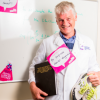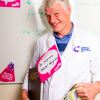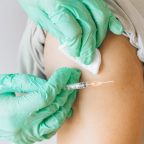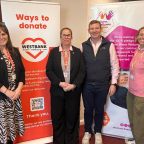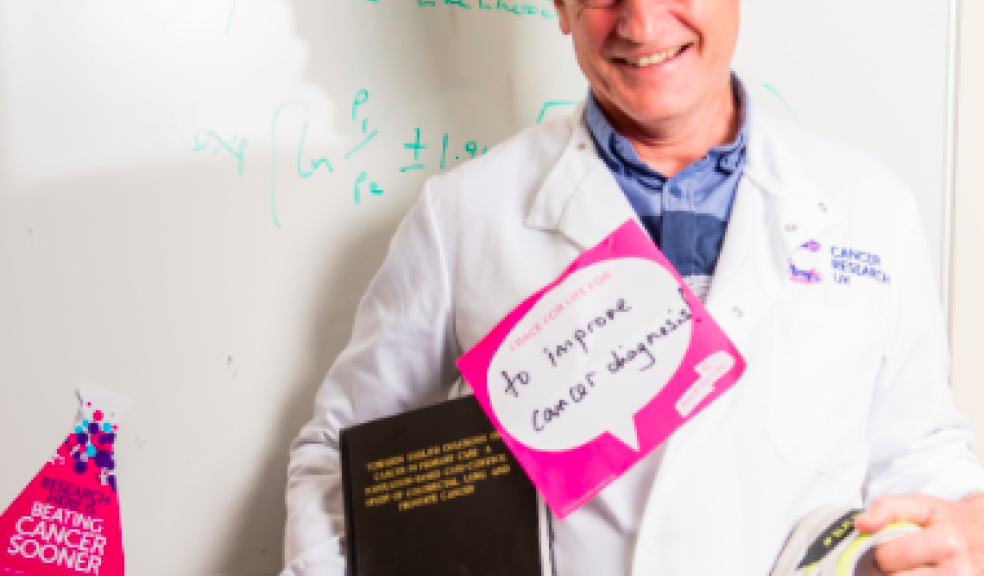
Exeter scientist urges women to take on Race for Life
A SCIENTIST in Exeter is urging women to back life-saving research - by signing up for Cancer Research UK’s Race for Life.
Prof Willie Hamilton, lead researcher and professor of primary care diagnostics at the University of Exeter, has spent much of his career working in collaboration to help discover new and more effective ways to diagnose cancer by applying different methods to GP surgeries.
As a GP himself he has dedicated his working life to studying which cancer symptoms are the most important, so that GPs can more readily spot potential cancer at an earlier stage.
He wants to inspire women to enter the Race for Life events across Devon this summer by showing the difference they can make in the fight against cancer.
(see towns and cities below)
As a deaf scientist he has rarely struggled to make himself understood, having lost his hearing completely after he qualified in medicine, he has always been keen to promote the importance of funding.
So he held aloft a placard with the words ‘this is beating cancer’ to highlight the crucial connection between taking part and helping save lives by funding vital work into the prevention, diagnosis and treatment of the disease.
Prof Hamilton, said: “I’d like to say a huge ‘thank you’ to all the women who participate in Race for Life in Exeter and to everyone who supports them.
“There is a clear connection between all the mums, grans, daughters, sisters and friends of all ages who walk, jog or run their way around the events and the doctors, nurses and scientists in labs and hospitals, working on the front line against cancer. Without them, our work wouldn’t be possible so we are very grateful for their support and commitment.”
Professor Hamilton’s own mother died of cancer when he was a young medical student and his work as a GP in the city has put him at the forefront of dealing with patients undergoing cancer treatments.
Prof Hamilton and his team of researchers are working with others in three UK sites and across the globe on a five year project that will help GPs to detect cancers in a primary care setting and reduce the burden of referrals.
This research will prioritise ‘difficult-to-diagnose’ cancers, which are also associated with poorer survival outcomes, and will look at both existing and novel technologies.
Prof Hamilton is determined to encourage women to take part in Race for Life and help to raise vital funds, as he knows research has the power to save lives.
Race for Life events raise millions of pounds every year to help beat cancer sooner by funding vital research.
This makes funding long-term research and pioneering trials possible, leading to new tests and kinder treatments which could save the lives of men, women and children across Devon and beyond.
Cancer Research UK research and clinical trials have helped doctors use the drug tamoxifen to its full potential, revolutionising treatment and prevention of breast cancer and boosting survival. And the charity’s early research work helped develop cisplatin, which is now used to treat testicular and other types of cancer.
Alison Birkett, Cancer Research UK spokesperson for Devon, said: “By taking part in Race for Life, women in Devon can make a real difference in the fight against cancer.
“One in two people in the UK will be diagnosed with cancer at some point in their lives. Research is very expensive and the only way we can afford to fund it is with the help of our supporters. Money raised through Race for Life is helping to drive life-saving research in to over 200 different types of cancer - so every person, step and penny raised counts.”
“Our aim is that one day everyone will survive cancer and the more women who Race for Life, the sooner that day will come. Money raised - whether it’s £10 or £100 - will help Cancer Research UK scientists understand more about how to prevent the disease and to find new ways to diagnose and treat cancer, helping save more lives.”
To enter Race for Life today visit www.raceforlife.org or call 0300 123 0770.
Box Out here linking to advances in research:
Every day, 90 people are diagnosed with cancer in the West of England*.
The CanTest is part of Cancer Research UK’s Catalyst Award which aims to help researchers deliver trailblazing progress in their field with long-lasting results.
The CanTest team, led by Professor Willie Hamilton - from the University of Exeter will work with researchers in three UK sites and across the globe on a five year project that will help GPs to detect cancers in a primary care setting and reduce the burden of referrals.
The Catalyst Award supports capacity building and collaboration in population health with up to £5 million awarded to enable teams to deliver impact over and above what they could do alone.
The Award aims to boost progress aligned to Cancer Research UK’s strategic priorities by building new collaborations within and between institutions, also involving researchers based at the University of Cambridge, UCL (University College London) and the University of Leeds and a number of international institutions.
Research is improving survival all the time:
• Cancer survival in the UK has doubled in the last 40 years.
• 98 per cent of men diagnosed with testicular cancer now survive their disease for 10 years or more.
• Almost 9 in 10 children diagnosed with leukaemia survive for 10 years or more.
• More women are surviving breast cancer than ever before.










